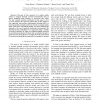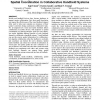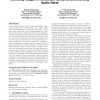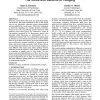996 search results - page 150 / 200 » How people use the web on mobile devices |
HPCA
2011
IEEE
13 years 20 days ago
2011
IEEE
Dynamic languages such as Javascript are the de-facto standard for web applications. However, generating efficient code for dynamically-typed languages is a challenge, because it...
ICRA
2010
IEEE
13 years 7 months ago
2010
IEEE
— The goal of this research is to enable mobile robots to navigate through crowded environments such as indoor shopping malls, airports, or downtown side walks. The key research ...
CSCW
2012
ACM
12 years 4 months ago
2012
ACM
Mobile and handheld devices have become platforms to support remote collaboration. But, their small form-factor may impact the effectiveness of the visual feedback channel often u...
WWW
2005
ACM
14 years 9 months ago
2005
ACM
Focused Web browsing activities such as periodically looking up headline news, weather reports, etc., which require only selective fragments of particular Web pages, can be made m...
WACC
1999
ACM
14 years 1 months ago
1999
ACM
Electronic conversations often seem less polite than spoken conversations. The usual explanation for this is that people who are not physically copresent become depersonalized and...




